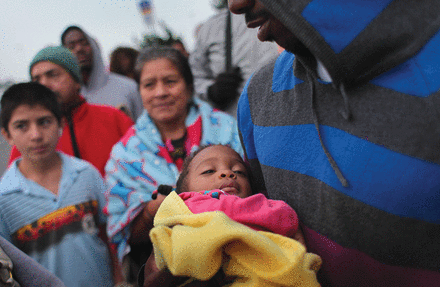When it comes to health, there are many factors that influence how long and how well people will live, from the quality of their education to the cleanliness of their environment. But of all social determinants of health, research shows there is one that is perhaps the most influential: income.

Cheyenne Benjamin, 1, waits to receive free health care in August 2009 at a Remote Area Medical clinic in Inglewood, California. While the family had health insurance, her mother, Chonie, said they could not afford co-pays. Research shows that income and health are linked, with increased life expectancy among Americans who earn more money.
Public health workers have long been witness to the inextricable links between poor health and poverty. Science consistently shows that low incomes are a significant risk factor in disease incidence and severity as well as life expectancy.
For example, in a study published in April in the Journal of the American Medical Association that examined more than 1 billion U.S. tax records from 1999 through 2014, researchers found that higher income was linked with longer life, with differences in life expectancy across income groups increasing over time.
In particular, the study found that the gap in life expectancy between the richest 1 percent and poorest 1 percent was more than 14 years for men and more than a decade for women. Inequality in life expectancy increased as well, with men and women in the top 5 percent of income distribution gaining about three years of life expectancy, while those in the bottom 5 percent gained virtually no additional years of life.
However, the effect of income on health is much more nuanced than the divide between the richest and poorest Americans.
“Research also shows that at all levels of income, our health is affected by economic conditions, so even middle-class and upper-middle-class people are in worse health than richer people,” said APHA member Steven Woolf, MD, MPH, director of the Virginia Commonwealth University Center on Society and Health. “We’re all in this together — it’s not a problem restricted to the very poor.”
While higher incomes and wealth are linked to better health within the U.S., their protective nature does not perform as well in a global context. Woolf co-authored a 2013 report from the National Academies of Sciences, Engineering and Medicine that compared Americans’ health to counterparts in 16 other high-income nations, finding that Americans typically die sooner and incur higher rates of disease and injury than many of their peers. In fact, the report found that even rich Americans are less healthy than their global counterparts.
Woolf noted that the reasons for such global difference are not entirely clear. But he said one contributor may be the growing gap between the high- and low-income people in the U.S. — otherwise known as income inequality. For instance, the “2015 County Health Rankings” report, which included income inequality measures for the first time, found that the unhealthiest counties also had greater income inequality.
Analysis: This article provides many facts and anecdotes to support the notion that wealth often determines health. The effect of income on health being more nuanced than the divide between the richest and poorest Americans shows this is a problematic that needs to be addressed. It makes me question public health design and how issues in the banking industry are becoming issues of public health. Our finances impact our ability to survive and to live the type of life we want to be living, whatever that may be. When banks make it harder for people with low financial status to access their services (due to technology, financial literacy and much more), it deepens the disparity between the rich and poor and pushes those in tough financial situations to take alternative paths to manage their money. In thinking about this reading for older adults, wealth and ability becomes even more of a crisis issue. For some older adults, they may no longer have the ability to work, manage their money, and utilize certain technology, so it is important that I utilize my research to nudge banks to make more inclusive changes to their business, products and services.
Citation:
Krisberg, K. (2016, October 1). Income inequality: When wealth determines health: Earnings influential as lifelong social determinant of health. The Nation’s Health. https://www.thenationshealth.org/content/46/8/1.1




